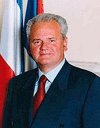
Hungary: Bloody Monday
The police crackdown against peaceful demonstrators on the night of October 23, 2006, shows that there is very little difference between the past and the present.

The police crackdown against peaceful demonstrators on the night of October 23, 2006, shows that there is very little difference between the past and the present.

Slobodan Milosevic is an innocent man. Technically, this is the final outcome of his trial at The Hague. With his death on Saturday, he was able to escape responsibility for the part he played in the Balkan wars of the 1990s. A person is innocent until proven guilty, and since he was not convicted while he was alive of any crime, he has thus died an innocent man. Technically, at least.

In response to an article I wrote in wake of the French "no" vote, a reader commented that I had simply produced "another article not asking why this constitution was rejected". In many ways, he was correct: irrespective of whether you thought the result was positive or negative, people ended up focusing on the consequences, but nobody really looked into why it really happened.

Mark Twain once observed that we have “lies, damn lies, and then statistics.” Unfortunately, to understand the world, we are often forced to dance with that devil, and hope it explains what’s actually happening. A recent United Nations’ publication, “Economic and Financial Globalization: What the Numbers Say,” attempts to do that, but leaves out some relevant details.
Population Density and Demographics: The report offered some surprises here. Population is increasing rapidly in the largest countries, especially Pakistan. But Russia’s population has actually fallen in recent years. Generally, growth is much slower in industrialized nations than developing ones: Although the population of North America – 320 million in 1950 – is expected to reach 500 million by 2010, its share of the world total is projected to drop from 17 to 10 percent.

The moment people in Central Europe have been waiting for has finally arrived. NATO jets are bombing the former Yugoslavia. Although it comes as no surprise, on all sides of the conflict people still shake their heads: Kosovo Albanians wonder why took so long for NATO to act; Serbs are reaffirmed in the belief that they have no friends and are victims of US neo-imperialism; meanwhile, neighboring countries nervously watch and pray that they won’t get sucked into the conflict.
Unlike previous bombing assignments undertaken by NATO to enforce the "peace" (e.g., Bosnia and Iraq), support for this one within the region is minimal. Many Bosnians are actually opposed to the bombing, fearing that if Kosovo gets autonomy, Republika Srpska will get it, too. In other words, old wounds are being reopened before they have had a chance to heal.

When dealing with energy questions, Europeans face two uncomfortable facts. First, the price of oil has tripled since 1999; and second, Europe lacks a clear energy policy. Aside from special treaty provisions for coal and nuclear power, the European Union (EU) has hardly addressed the issues of energy sources and supply security. Yet, it already imports half its energy, and, by 2030, the figure is expected to reach 70 percent.
Coal imports overtook production in 1995. Current production in the 15 EU countries is less than half of what it was 10 years ago, and one-seventh the output of the early 1960s. Germany and Spain are running down their mines, France will stop producing in 2005, and Portugal and Belgium no longer turn out any coal at all. Only Britain’s privatized mines have a chance of competing. Poland produces more coal than the rest of the region combined, but is restructuring to prepare for EU entry. If there is any future for European coal, it’s only as a strategic reserve in times of crisis.
Copyright Toward Freedom 2019